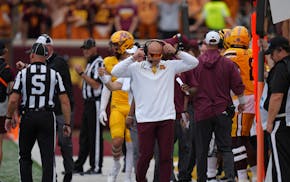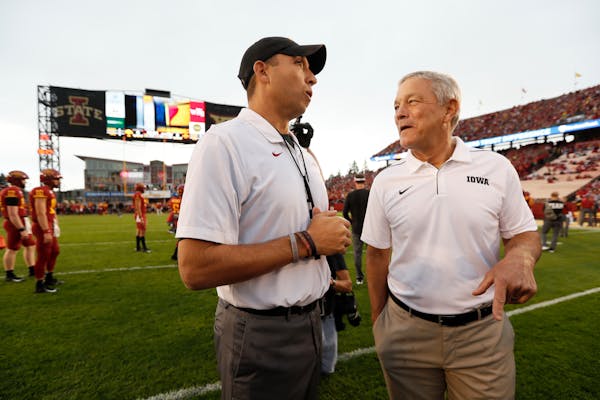There will be a meeting of the College Football Playoff decisionmakers on Thursday in Dallas that includes 10 conference commissioners and Notre Dame athletic director Jack Swarbrick. They will be there to come up with a plan to implement a 12-team CFP tournament, and the sooner the happier for their bosses.
"Our presidents voted last week for a 12-team playoff system no later than 2026, and they have told us, 'Get it done,' '' said Craig Thompson, in his 24th season as commissioner of the Mountain West Conference.
Thompson, a University of Minnesota alum, was on the four-person committee that studied for months the idea of expanding the CFP from the original four-team format that started in January 2014.
That small group's recommendation last September was to raise the playoff field to 12 teams. It was a system that guaranteed at least one bid for the lower-budget Group of Five conferences — including Thompson's.
The larger CFP body turned down the committee's recommendation this past February, saying it wanted to concentrate on "fixing'' the chaos that was overtaking college football and to deal with playoff expansion later.
"I don't know what changed between February, and the presidents voting unanimously to go with a 12-team plan last week,'' Thompson said.
I'm guessing it was more chaos than could've been imagined, with Southern Cal and UCLA campaigning and then succeeding to join the Big Ten — a modern-day California Gold Rush in the opposite direction.
Once that happened on June 30, 10 months after Oklahoma and Texas bailed out of the Big 12 for the SEC, the presidents had to concede all that remained of their collective consciences when it came to football's rightful place in an academic institution had been devoured by The Beast of Billions from television.
"Four teams providing the thrill of frequent playoff mismatches?'' the presidents asked rhetorically.
"Why not make it 12 teams certain to provide more numerous mismatches — 11 games total instead of three, with hundreds of millions added down the road?'' the presidents responded unanimously.
On Tuesday, Thompson was talking from his Mountain West office in Denver and said:
"It's quite a time in college football. I think we could be headed for pay-for-play in football. Actually, I would say pay-for-play is on the way.
"The athletes see their coaches moving around, getting contracts for 10s of millions, and it would be natural to say, 'We're the ones winning games. We're the ones putting on the show for television. Where's ours?' "
Thompson wasn't talking about the NIL deals — name, image and likeness — that some Division I athletes have been fortunate to sign in recent years.
This was more like, ''You're a starting center for the Gophers, you make this much money,'' and, presumably, any NIL would be a separate deal not involving the schools that are sponsoring big-time football.
The most-intriguing discussion at this week's CFP meeting in Dallas will be with ESPN, which holds the rights to the playoff through the 2025 season.
"ESPN has the right to the CFP semifinals and championship game for four more seasons,'' Thompson said. "The presidents would like us to start this format two seasons earlier. The question becomes if ESPN would let some other networks participate in the earlier rounds of a 12-team bracket.
"We need an answer on that before we could decide on which bowls could be used for which playoff games, and all the rest.''
These are the conferences still considered Power Five: SEC, Big Ten, Atlantic Coast, Big 12 and Pac-12. The Mountain West is in the Group of Five with the American, Sun Belt, Conference USA and Mid-American.
The raiding could continue, and there's a very good chance it will be the Power Four within a couple of years: SEC, Big Ten, Atlantic Coast and a conglomerate of the emaciated Big 12/Pac-12.
The 12-team playoff plan calls for the six highest-rated conference champions to be automatic, and then six at-large bids that figure to be dominated by the SEC and the Big Ten.
The six conference champs guarantee a Group of Five team based in the field. On Tuesday, I said to Thompson:
"I'm skeptical that if the Power Five goes down to four, that ESPN and other TV outlets would OK a system where the Group of Five is guaranteed two bids.''
Thompson said: "That won't be a problem. It says, 'Six highest-rated conference champions.' A couple of years ago, we had two conference champions rated ahead of any team from the Pac-12.
"So, if we had the system we're headed to then, we would've had two teams in the playoff. They'll be fine with having two deserving champs from our conferences.''

Reusse: As Caswell Park does itself proud, a hometown team runs hard into a challenge

Reusse: Jim Marshall belonged to us, and Minnesota loved him for it

Reusse: Murphy's return will be a fun time on the ice

Reusse: Gophers vs. Huskers and an 80th birthday on a fall Friday? Good day to be a homer again


